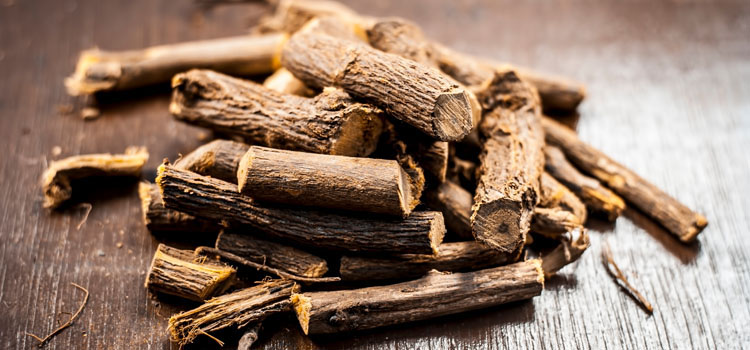Licorice
Medicinal uses
The root serves as an emollient, demulcent, attenuant, expectorant, detergent.,and a diuretic. The root ‘abates thirst in dropsies’, ‘helps deflections of the breast’, ‘softens acrimonious humors’. ’ temperate salt’. ‘Allays the heat of the blood’, promotes urine, and thickens the sanguinary fluid, when too thin’. Moreover, the root is ‘good for pleurisy, gravel, dysury,and intense pain’. The root ‘abates thirst in dropsies’, ‘helps deflections of the breast’, ‘softens acrimonious humours’. ’ temperatures salt’ ‘allays the heat of the blood’, promotes urine, and thickens the sanguinary fluid, when too thin’. Moreover, the root is ‘good for pleurisy, gravel, dysury and intense pain’. Diabetes, which affects at least 25% of the adult population has been commonly treated with G~cyrrhizu …. The medicine man will prescribe licorice to ‘keep sugar down’, a practice which demonstrates that the inherent sweetness of licorice is thought to reflect the plant’s medicinal function to treat diseases caused by high sugar levels . In modern Chinese medicine, many medicinal remedies contain licorice as an ingredient.Licorice continues to serve as a flavoring agent, sweetening the bitter taste of many drugs, as a filler for pills, and as an ‘essential ingredient in ointments for treating skin diseases’.Licorice also slows and prolongs the effects of strong tonic medicines. Because the Chinese recognize the capacity of licorice to imitate the activity of adrenocortical hormones, they use licorice to treat Addison’s disease.Aside from its universal role as an expectorant and demulcent in many familiar over-the-counter remedies, licorice root has been featured in powdered form as a filler for pills in the U.S.A. as well, both enhancing the consistency of the pill and coating the surface. Some commercial hand, body, and skin lotions contain licorice as an ingredient. Furthermore, it is also used in ointments as a remedy for various skin disorders since glucocorticoid action is potentiated by either glycyrrhizin or glycyrrhetinic acid.Eczema is the term for a group of skin conditions that, according to the National Eczema Association, affect over 30 million people in the United States.Eczema can cause itching, redness, scaling, and inflammation.Glycyrrhiza glabra extract, or licorice root extract, may be effective against bacteria that can infect the skin, according to a study in the Iranian Journal of Pharmaceutical Research Trusted Source.
Stomach discomfort and ulcers
A double-blind study Trusted Source found that an extract containing glabridin and glabrene, which are flavonoids present in licorice root, was effective in relieving stomach discomfort. The extract reduced nausea, stomach pain, and heartburn.
Hepatitis C
Glycyrrhizin may help treat hepatitis C, a virus that infects the liver. Without treatment, hepatitis C can cause inflammation and long-term liver damage. Researchers Trusted Source have reported that glycyrrhizin demonstrates antimicrobial activity against hepatitis C in cell samples and may hold promise as a future treatment for this virus.
Tooth decay
Some research suggests that licorice may help kill bacteria in the mouth that cause tooth decay.However, although licorice has demonstrated antibacterial activity in the laboratory setting, human studies have not yet proven that it has any cavity-fighting power. Its ability to inhibit the growth of oral bacteria means that it does have potential as a future cavity treatment though.
Sore throat
Many people think of licorice as a sore throat remedy. A small study recruited people who were having a breathing tube inserted into their windpipe before surgery. Following its removal, the breathing tube can cause a postoperative sore throat, known as POST.The researchers showed that gargling a licorice solution for 1–15 minutes before surgery was as effective as a ketamine gargle in reducing the incidence and severity of POST.
Lower potassium levels
Consuming too much licorice can cause potassium levels to drop. According to the U.S. Food and Drug Administration (FDA) Trusted Source, this can lead to:abnormal heart rhythms high blood pressure swelling lethargy congestive heart failure.


